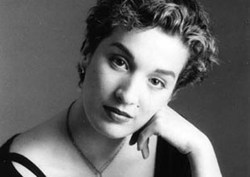

|
|
|
Dulce Pontes - Canção do Mar
Country - Portugal Player - Pedro Sa

| Fui bailar no meu
batel Além do mar cruel E o mar bramindo Diz que eu fui roubar A luz sem par Do teu olhar tão lindo Vem
saber se o mar terá razão Se eu bailar no meu batel |
I was dancing on my little boat Come see if the sea was right If I go dancing upon my boat |
| Player's comments: |
She spent her childhood and adolescence listening to Amália Rodrigues, Zeca Afonso, Argentina Santos, Fernando Maurício, and Carlos do Carmo, among others. At the age of 7, she started her musical studies at Lisbon's National Conservatory. She dreamed of becoming a dancer, a dream she probably would have realized, but didn't begin studying dance until she was 9. She made her debut as a performer at the age of 16, as the lead singer of the rock band "Os Percapita". She also was responsible for the choreography and composed some of their songs. In 1988, she answered a newspaper ad asking for young girls between the ages of 18 and 24, and received an audition with Namouche Studios, who chose her to work on an advertisement. Shortly thereafter, she was chosen to replace the lead actress and singer in the musical comedy "Enfim Sós", in Lisbon. This was the start of her professional career. The following year she was given an important part in another musical comedy, "Quem Tramou O Comendador?". Later, she also joined the cast of Casino Estoril show "007 - Licença Para Jogar". She subsequently participated in several television programs, like the popular contest "1-2-3", as well as publicity spots. From this period, we can't forget her participation in the TV show, "Regresso ao Passado" hosted by Júlio Isidro. Every Sunday afternoon she gave us unforgettable interpretations of many well known popular songs from the past, especially from the 60s and 70s, from all around the world, and sung in various languages. By this time she was well known to the Portuguese audience, but on March 7, 1991 she became a public figure by winning that year's Portuguese Song Contest, singing none other than "Lusitana Paixão", which was later included in her first CD. She was also awarded with the prize for the Best Interpretation. Maybe it would be interesting to point out that after a survey made by RTP (Portuguese Public Television), the TV station responsible for the song contest each year, this song was considered the most beautiful song ever to win the contest since it's beginning in the early 60s. Probably Dulce had something to do with it? Due to her victory in the Portuguese Song contest, she won the right to represent Portugal in the Eurovision Song Contest that took place in Rome of 1991. This was the first time that Dulce was heard outside her own country, and she gave Portugal one of the best classifications in the Eurovision song contest, 8th place out of 22 contestants. She enchanted the European audiences to a level that she was considered by the present journalists, contestants, and musicians, as the best voice and the best performer. The English version of her song, "Tell Me", was released shortly after in Belgium. She was then invited to Mexico, where in December of that year she participated in OTI festival in Acapulco and achieved 4th place. After the Eurovision Song Contest, Dulce started looking for a repertoire of her own with which she could identify. In May 1992, she released her first CD album, LUSITANA, including "Lusitana Paixão" as the tenth track. The CD got very good reviews. Later on that year, she was invited to sing on the European Eurovision Lottery's show in Turkey, and also on the "Mar e Mar" show on TV Galicia in Spain. And then there was "Lágrimas".
In her 2nd CD, LÁGRIMAS, released in 1993, she performed various old "Fados" that had been made famous by Amália Rodrigues, including "Lágrimas", "Povo que lavas no rio", and "Canção do mar". It could be said that her career, with the international dimension it has today, started at this point. Dulce reinvented the "Fado". She performed it with a voice and soul of her own, but as Portuguese as those from the great Amália Rodrigues, who Dulce always admired so much and considered Fado's most celebrated singer. Most say that Dulce is the new Amália, meaning that she is the new symbol of the Portuguese Soul. Others say that in no way is she a "Fadista", she is too exotic! But Dulce is not a "Fadista" and yet she is a "Fadista" when she sings the "Fado". Her great and crystal voice doesn't fit any existing label! Her voice and her style are her own whether she sings a "Fado", a rock ballad, a popular folklore song, or a song from Angola. It is Dulce Pontes' way! Lágrimas was one of the best selling records in Portugal to date, having reached double platinum, and was released in several other countries with amazing success. She then conquered audiences
from places as unexpected and as far away as Taiwan or Holland, Japan
or Brazil. She was also invited to appear in television programs in Spain, The Netherlands, Belgium, Brazil, Japan, Germany, Switzerland, and Italy. In Portugal she was a guest of some of the most prestigious TV shows, including the Amália Rodrigues birthday celebration. Her voice then reached Hollywood. Dulce's "Canção do Mar" was chosen to be included in the soundtrack of the movie "Primal Fear", starring Richard Gere (1996). That same song had already been part of the soundtrack of the Brazilian soap opera, "As Pupilas do Senhor Reitor" (SBT-Brasil 1995). She also recorded "A Brisa do Coração", by Ennio Morriconne, which was included in the soundtrack of the movie "Sostiene Pereira" ("Afirma Pereira") with Marcello Mastroianni (1996). In 1995 she released a single CD, "A Brisa do Coração", with the theme from the movie. That same year she released a double CD, A BRISA DO CORAÇÃO, which is considered to be the living testimony of a "magic night", as Dulce herself calls it, recorded live during a May 6, 1995 concert in Coliseu do Porto. The CD reached platinum. In 1996 CAMINHOS ws released. There she continued to devote herself to "Fado". This CD had the participation of several guest musicians, including Xiradela, Leonardo Amuedo, and Carlos Nuñes, and featured lyrics from some of the most important Portuguese poets, including Fernando Pessoa. Dulce chose a melody that she had composed earlier and used it with Fernando Pessoa's poem, "O Infante", to create one of the most beautiful tracks from this CD. Then, as today, wherever she performs, Spain, France, Belgium, Holland, Germany, Italy, United States, Japan, or Brazil, even singing in such a "strange" language, she proves over and over that music is THE universal language! She has received several awards over the years, among them "R.C.L." for the Best Live Concerts, and in 1995 "Prémio Bordalo", a traditional award by "Casa da Imprensa", a Portuguese press association, for the Best Female Voice. She was also awarded "Globo de Ouro", organized by SIC Television and "Caras" magazine, in it's first edition in 1995. In 1997 she won "Grande Prémio TV Guia", organized by TV Guia magazine, in and Troféu Nova Gente, by Revista Nova Gente. Caminhos tour began in February 1997 with performances in Japan, Spain, Germany, Belgium, Austria, Italy, South Africa, Canada, and United States. In May 1997 she was invited to perform at the television concert "Yes for Europe", an event that was broadcast worldwide. She performed at the 52nd anniversary of the United Nations in New York, and at the International Amnesty concert in Madrid on December 9, 1997. During 1998, she toured through Italy and began a Dutch/Belgian tour. She joined other well known voices and performed unforgettable duets. On October 26 she participated in the FAO sponsored World Food Day in Rome, and sang, among others, a duet with Brazilian Caetano Veloso, an event which was broadcast world wide. She also appeared in the Portuguese TV show "Atlântico" with the Brazilian Simone. And also Andrea Bocelli with
whom she recorded the ballad "O Mare e Tu". Dulce says, "concerts are the most happy and intense moments of my life. During them I give myself completely. They are my reason to live." In September 1999, almost 3 years after "Caminhos", Dulce released her latest CD O PRIMEIRO CANTO. This was a long thought out album, as most songs, both lyrics and music, are Dulce's originals. The sound is different from her well known Caminhos and Lágrimas. She sounds more mature. She dares to go farther. "O Primeiro Canto" was also her first release on the Universal Music Holland label. This CD has made her one of the studio's rising stars, with success not only in Portugal, reaching platinum in December 1999, but also in Italy, Spain, Holland, and Brazil. In the Future? She is now touring throughout Porgutal promoting "O Primeiro Canto". Dulce is a perfectionist. She keeps searching for the perfect way as she drinks knowledge and inspiration with musicians and performers from all over the world; Kepa Junkera, Leonardo Anuedo, Carlos Nuñes, Waldemar Bastos, Justin Vali, Wayne Shorter, Jaques Morelenbaum. She journeys throughout Portugal, tape recorder in hand, searching for traditional sounds, but also open to the exotic sounds of new instruments currently unfamiliar to the Portuguese culture. She is able to sing in any language, any rhythm. She started playing the piano to accompany her singing, and started composing her own songs. She always remembers to improve her technique, but doesn't forget, "I think feeling is more important"... ...and it probably is. Nothing else could explain why an entire Japanese audience could be so moved by her performance of a Portuguese Fado that they asked her, over and over, to sing it again. Dulce Pontes is indeed a most sweet bridge that links all music lovers of the world to the enchanted world of music. |